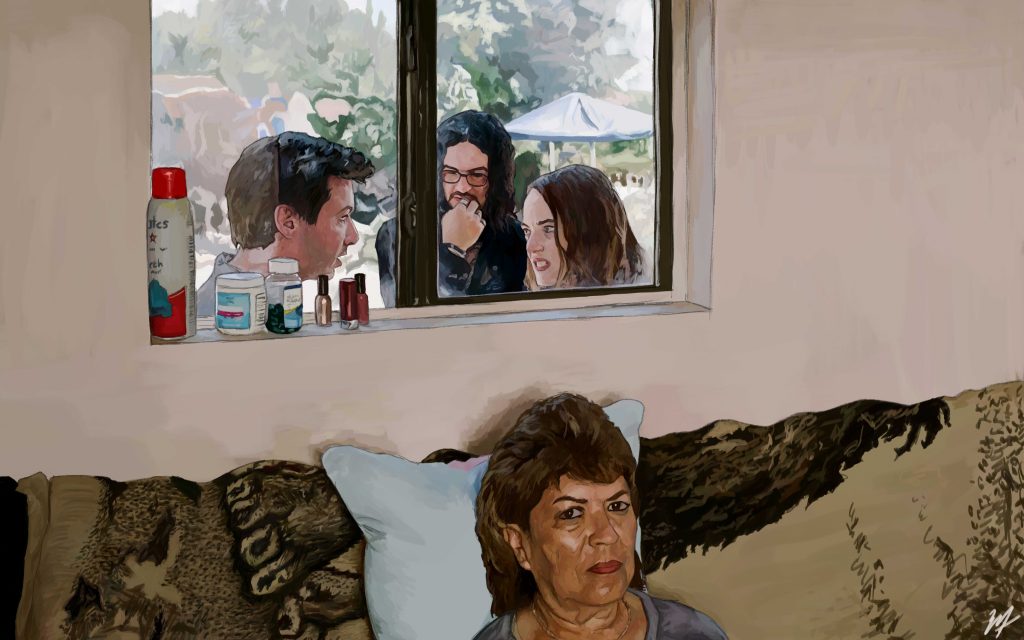
Nathan Fielder is modern television’s master of discomfort. The Canadian comedian first rose to prominence with his docu-reality show “Nathan For You,” in which he employs his business background to execute eccentric schemes to increase profits for small companies. Through this series, Fielder developed a reputation for injecting his projects with a distinctly offbeat essence. A similar ambience permeated his follow-up show “The Rehearsal,” although more of its focus seemed dedicated to eliciting philosophical reflection than merely providing a vehicle for attention-grabbing humor. Formulated around the idea of allowing subjects to rehearse for big life moments via elaborately crafted simulations, Fielder’s sophomore series sought to grapple with the blurred lines between reality and fiction. This thematic through-line persists into Fielder’s latest dark comedy series “The Curse” in such a way that is equally uncomfortable and mesmerizing to watch.
Produced by A24 and co-created by Fielder along with filmmaker Benny Safdie, “The Curse” follows newlyweds Asher (Fielder) and Whitney Siegal (Emma Stone) as they begin production on a freshly greenlit HGTV show. The concept behind the Siegals’ envisioned show, titled Flipanthropy, is to document their ill-founded attempts to uplift the community present in the city of Española, New Mexico. Headed by cunningly manipulative TV producer Dougie Schecter (Safdie), the Siegals’ questionable project soon spirals into a complicated web of deception, paranoia, and ulterior motives that calls into question the moral fiber of the parties involved.
“The Curse” bears a captivating peculiarity that flows throughout its every aspect, nonchalantly sticking out like a sore thumb amidst the endless sea of content that is modern television. Maceo Bishop’s cinematography and the shot composition embody a noticeable voyeuristic quality. Many of the scenes are shot at considerable distances from the characters and take on unconventional angles, slowly panning as if to discretely track various movements.
In this way, the show’s visual language bears more resemblance to a hidden camera affair like “Impractical Jokers” than a scripted drama. There are, in fact, several moments captured from behind the cover of plants or around the corner of a wall. These deliberate creative decisions add a fascinating dual effect. On one hand, it allows viewers to feel more ingrained in the narrative as if they are receiving a secret peek into the characters’ lives. But it also feels creepily alienating, as though the audience is not meant to witness certain encounters unfold. The unusual cinematography present in “The Curse” is a strikingly simple example of establishing a distinct style without needing to be particularly revolutionary or extravagant. Keyboardist and composer John Medeski’s score demonstrates similar restraint whilst contributing much to the intended atmosphere. Its reliance on distorted synths, odd rhythms and entrancing melodies further submerges viewers in the show’s alluringly weird depths.
These elements in conjunction with the off-putting nature of the leading characters complete the show’s omnipresent sense of disturbing intrigue. The opening minutes of the series succinctly establish the tone and character dynamics that uphold the remainder of the season. It features Asher, Whitney, and Dougie filming a scene for Flipanthropy, which involves an interview with a pair of Española natives. Asher is imbued with Fielder’s signature deadpan delivery, giving the impression that he’s simply reciting lines from an internalized script with no conveyed interest. Whitney evokes a similar synthetic sympathy, with Emma Stone brilliantly capturing the facade of compassion her character assumes whenever interacting with the Española community. Meanwhile, Safdie’s Dougie insists on over-dramatizing the exchange to add heightened emotion to the show. It is undoubtedly an uncomfortable yet amusing preamble to the series, as it becomes immediately apparent that these characters’ outward behaviors and mannerisms are not founded upon any sort of sincere care for the community. Consequently, it makes viewers distrust the central protagonists from the very start.
For that reason, many may find themselves repelled from continuing on the 10-episode journey with this trio of characters. They are a set of pathetically twisted individuals and the show does not attempt to provide the illusion that viewers are supposed to root for them. Quite the opposite holds true throughout most of the runtime, presenting a boundless slew of moments that seem determined to leave audiences utterly disgusted or embarrassed. However, through a miraculous mixture of finely tuned screenwriting and the superb believability of each performance, the characters are never reduced to poorly defined caricatures. Though most of the series proves an unsettling watch, it can be argued this result is achieved through the immense depths to which these characters are fleshed out and developed. Perhaps what is most disturbing is the show’s unbridled ambition to feature fully realized protagonists who reflect the most disconcerting aspects of ourselves, drawing from the darkest, most veiled wells of humanity.
In keeping with the distressing undertones of Fielder’s previous projects, “The Curse,” at its core, demonstrates humanity’s self-inflicted dishonesty as a means of holding firmer control over our perceived world. As exemplified by the show’s overarching themes, it is common for us to utilize fabricated fiction as a means to reduce certain fears and insecurities regarding cruel realities. In exploring this subject matter, Fielder and company present an uncompromisingly divisive vision, evidenced by its mixed reception among general audiences. While abundantly lacking in mass appeal, for those willing to push through its oftentimes skin-crawlingly strange reaches, “The Curse” offers an experience like no other, seeping with artistic value. All episodes of “The Curse” are now streaming exclusively on Paramount+ with SHOWTIME.


